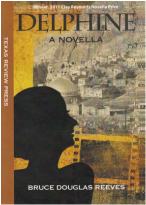DELPHINE, winner of the 2011 Clay Reynolds Novella Prize, published 2012 by Texas Review PressBecause of her extraordinary dark-haired beauty, Delphine became a reluctant success, first as a model, then as an actress. Her work with a great French film director brought her international movie stardom. A famous Italian director gave her a daughter. Still searching for something else in her life, Delphine and her little girl explored the world together, from London to Vietnam, Paris to Istanbul, and beyond. Fascinated by the Middle East, she explored and lived in many parts of the ancient world, including Palestine. Men loved her and she loved some of them, but still she was restless. Deeply affected when she sees the massive wall severing Palestinian lands from Israeli territory, Delphine is determined to learn the facts and see first-hand the hardships faced by ordinary Palestinian citizens. Eventually, she raises the money to produce and star in a movie about the Palestinian territories. Although the working conditions are brutal and dangerous, she is determined to finish the movie, even if it's the last she ever makes. __________________________________________________ "The Allure of this narrative is deceptive in that it offers a cunning misdirection. Apparently, it is about a young, beautiful, talented, intelligent, self-sufficient, self-confident woman who dictates terms for life herself and to hell with everyone else, but almost before it's realized, the reader is drawn into a much more compassionate and caring story of involvement, commitment, and even love, not for a person but for a people. By the end, one cannot help but to have fallen in love with her, as well, and to feel how deeply she feels her need to give herself and her talent in an attempt to make a better world." --Clay Reynolds, series judge. __________________________________________________________________ |
More than two decades ago, my wife and I fell in love with the countries that we in the West label the Middle East. Even as I write that, I’m reminded that the term “Middle East” is West-centric and conveys an attitude. Middle compared to what? “Far East?” Far from where? From Europe and America? Are these the basis for all geographic and cultural definitions? Point of view matters, although that's often forgotten as we trot out the familiar phrases and words.
|
